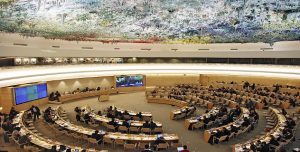
The United Nation’s Human Rights Council
This November, China will be held accountable for its human rights track record at the Human Rights Council in Geneva, Switzerland as part of the Universal Periodic Review (UPR) of human rights records of all 193 UN Member States.
Various reports have been prepared by civil society for presentation at the UPR. One report, by the Tibet Bureau mentions:
• economic marginalisation of Tibetans in their own country;
• a growing environmental crisis due to mass infrastructural projects; and
• repression of freedom of religion and expression.
It calls on the Chinese government to ensure measures are taken to preserve the economic, social and cultural rights of Tibetans, to stop forced evictions, the continued surveillance and the environmental degradation, and to reintroduce fair trials to those it accuses of destabilising the state.
The report submitted by the Tibet Bureau, Geneva has been endorsed by six human rights advocacy groups including the Unrepresented Nations and Peoples’ Organisation, Nonviolent Radical Party Transnational Trans party, Tibet Initiative Deutschland, Switzerland based Tibetan Community, Tibetan Friendship Association and Tibetan Women’s Association.
In a separate development also aimed at the UPR, FIDH (Worldwide Movement For Human Rights) and the International Campaign for Tibet (ICT) documented a dramatic deterioration of the human rights situation in Tibet. The joint FIDH-ICT report also offers a set of concrete recommendations that United Nations (UN) member states should make. It notes:
• the creation of an extremely repressive environment in which there are no limits to state authority;
• a systematic and widespread use of arbitrary detention, torture, and ill-treatment;
• increasing interference and controls over religion; and
• recurrent violations of Tibetans’ rights in the name of environmental protection and development.
The Chinese government is also actively promoting its case. The State Council Information Office has issued a white paper entitled, China’s Policies and Practices on Protecting Freedom of Religious Belief. Tibet Online describes the white paper as follows: “With detailed data and numerous facts, it systematically introduces China’s policies and laws for guaranteeing freedom of religion and comprehensively covers new achievements made in religious work in China.”




 Print
Print Email
Email